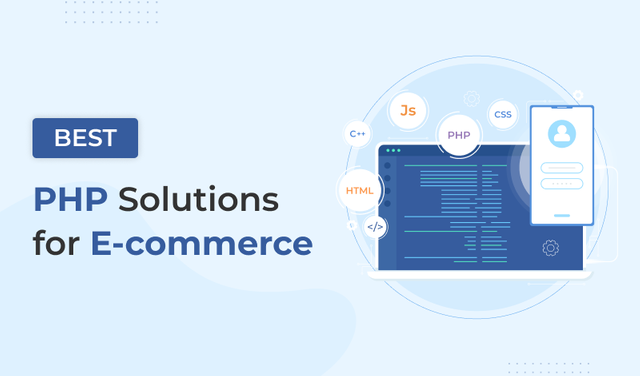
In this article, we’ll cover the 5 best PHP e-commerce solutions. One of the most attractive ways to enter the digital age is to start your own online business, more precisely, an online store. Online sales i.e. e-commerce business, globally, reached $1.6 trillion in 2015, and that was a staggering figure at the time. What then to say about last year’s figure of $4.9 trillion. By 2025, an even greater trading volume is expected: about $7.4 trillion. The era of online commerce has sunk its claws deep into the world market. Many companies and stores are now online. From physical to digital products, everything is now on the market and sold online.
What’s obvious, as e-commerce has experienced a boom in the market, the demand for software that would support online sales on all popular platforms has also increased. Moreover, trends in e-commerce are leading to a new approach to new customers that implies new and creative ways to achieve better sales. Numerous e-commerce software has appeared on the market and new, creative methods are being offered to sell products to the end customer.
WooCommerce
WooCommerce is a WordPress plugin that does a great job as it covers as much as 30% of the market. We can also call it the initial level of e-commerce software solutions because it’s easy to use and anyone can master it quickly. It also gives complete control over the online store, both to the owners and the development team that deals with its implementation and maintenance.
Pros:
You can divide the products into categories and assign them sales prices. WooCommerce stores can offer physical and virtual products.
There are over 2,000 different themes on the WordPress platform that allows users to change preset CSS styles and colors.
WooCommerce has a number of tools to help control details, track orders, and engage the customer. Users can view open orders, add new delivery status information, assign discount codes, and more.
Cons:
WooCommerce isn’t a complete e-commerce solutions. Those involved in its implementation must install multiple extensions to complete all functionalities.
It’s not suitable for handling complex and large e-commerce stores.
The basic plugin isn’t enough for a fully installed store.
Shopify
Shopify is a full-featured e-commerce platform that allows you to build, grow, and manage a company on the Internet. Anyone may set up an online store and sell their products using subscription-based software. Shopify merchants may use Shopify POS, its point-of-sale app, and hardware to sell in physical locations. Shopify is ranked second for the distribution of websites that launched e-commerce technologies, having a market share of 18%.
Pros:
One of the most frequently expressed compliments about this platform is how simple it is to use.
It’s ideal for incredibly large and complex online stores with tens of thousands of different products.
Shopify has a customer service team that is dedicated to helping customers.
Fully hosted platform with a variety of themes, customizability, and marketing ease, especially if you include email for your e-commerce website. At this level, incorporating an email strategy can assist you in nurturing leads and engaging current consumers. You may spend more time producing highly tailored and targeted messages because you’ll spend less time combing through data and transporting user data obtained by Benchmark to your email database.
Cons:
The platform plans’ pricing component.
Issues that have to do with customization.
Basic plans provide fewer content marketing options, reporting, and analytics.
The rigidity of the exit strategy.
Magento
Magento is another e-commerce solutions that provides customers with a customizable system and control over content, functionality, and graphics for their online stores via a software libre set-up. It ranks third with 9% of the total market share. Of course, we can say that this is an advanced solution for an online store. It also provides powerful SEO and directory management tools.
Pros:
Magento can be used for large e-shops and projects with thousands of products.
A large number of extensions that allow users to easily adapt the e-shop to specific needs.
Fully customizable and allows for the creation of completely unique stores.
Cons:
If you aren’t a developer, opening a store like this can cost you a lot.
As with other open-source projects, you have no technical support other than that on the forum.
Magento is bulky and slow to load, and templates can be difficult to integrate.
Read More: https://www.hiddentechies.com/blog/ecommerce-tips/best-php-solutions-for-e-commerce/